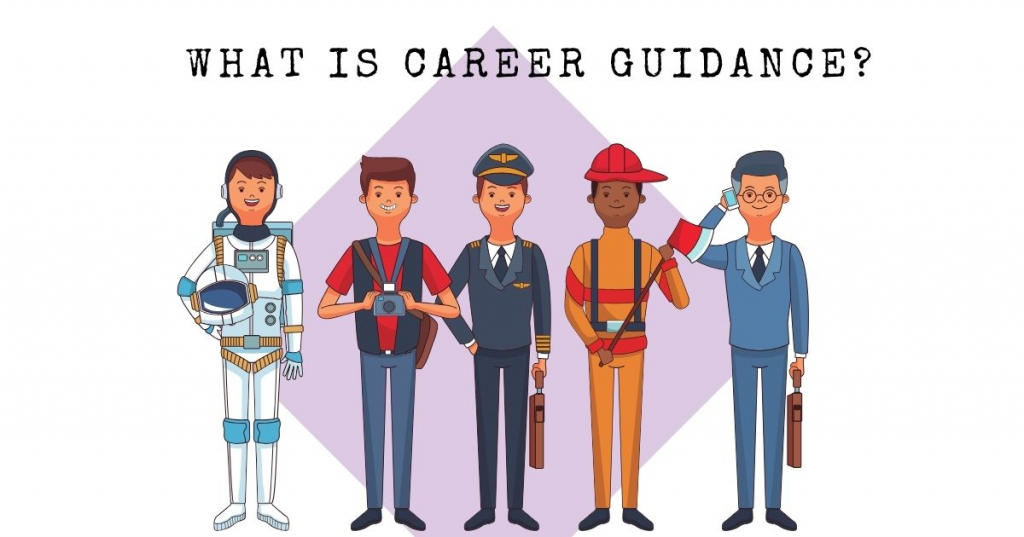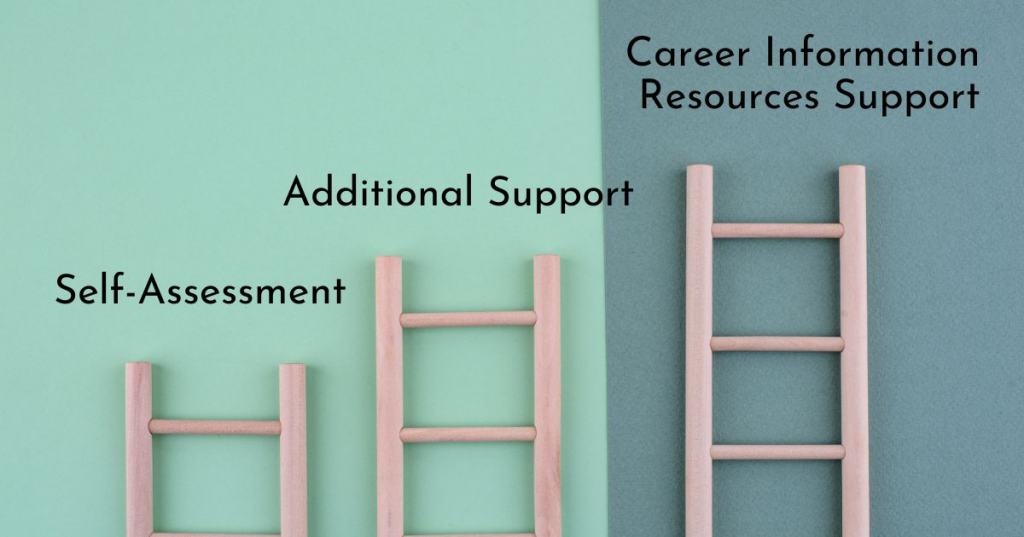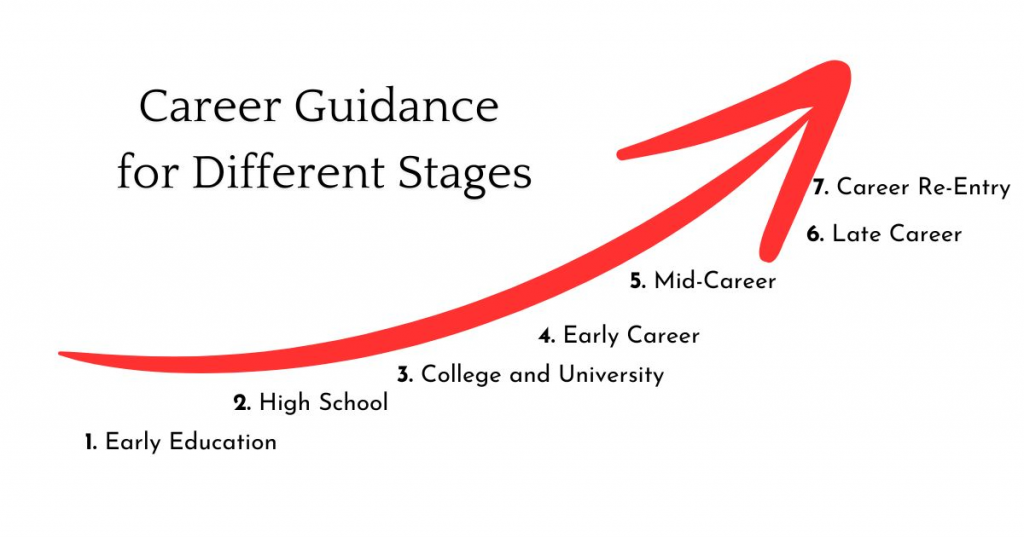How to Choose the Right Career? Career Guidance for You
The complexities of the modern job market can be daunting for individuals at any stage of their career. Career guidance plays a crucial role in helping people understand their skills, interests, and opportunities, ultimately leading them to make informed decisions about their professional paths.
This article will explore the essence of career guidance, its significance, the fundamental components involved, and how it varies across different stages of life. Additionally, it provides insights into choosing the right career, ensuring a fulfilling and successful professional journey.
Whether you are a student contemplating your future, a professional considering a career change, or someone seeking advice on career advancement, this article aims to equip you with the knowledge and tools to make strategic career decisions.
What is career guidance?

Career guidance is a comprehensive support system designed to help individuals make informed decisions about their career paths and professional development. It involves providing advice, resources, and tools to help people understand their skills, interests, and values, align them with potential career opportunities, and develop strategies to achieve their professional goals.
Importance of career guidance

Career guidance shapes an individual's professional path and ensures long-term career satisfaction. Here are several reasons why career guidance is essential:
Informed Decision-Making
Career guidance exposes you to a wide range of professions and industries. You can learn about different job roles, educational requirements, and potential career paths.
Once you have some initial ideas, you can delve deeper into specific careers. It might involve researching job descriptions, salary ranges, and growth opportunities.
Career guidance helps you connect your interests, skills, and values with potential career paths. The goal is to find a career that makes you feel fulfilled and allows you to utilize your strengths.
Personalized Career Paths
Career counselors assess an individual's interests, strengths, and weaknesses to suggest career paths that align with their attributes. This personalized approach ensures that individuals pursue careers suited to their unique skills and interests, leading to greater job satisfaction.
Besides, in-depth career guidance provides strategies for job searching, including resume writing, interview preparation, and networking tips. It equips individuals with the tools needed to navigate the job market successfully.
Skill Development
Career guidance helps individuals identify the skills needed for their desired careers and provides advice on acquiring them. It may involve recommending educational programs, vocational training, or certifications that enhance employability.
Increased Confidence
Having a clear career plan boosts an individual's confidence. Career guidance helps people set realistic goals, create actionable plans, and understand the steps needed to achieve their career objectives.
Preventing Career Missteps
Without proper guidance, individuals may choose career paths that do not suit them, leading to dissatisfaction, frequent job changes, or career stagnation. Career guidance helps prevent such missteps by providing clarity and direction from the outset.
Maintain Competitiveness
Career counselors stay updated on current job market trends and industry demands. They provide insights into which careers are growing and which skills are in demand, helping individuals stay competitive in the job market.
Support During Career Transitions
Career guidance is invaluable during career transitions, whether moving from school to work, changing careers, or re-entering the workforce. Counselors provide strategies and support to navigate these transitions smoothly.
For those considering a career change, career guidance can support in assessing transferable skills, exploring new career options, and planning the transition effectively.
Self-Discovery
Career guidance helps you identify your interests, passions, and values. What are you curious about? What kind of work environment would you thrive in? What are you naturally good at? What skills do you enjoy developing? Understanding these aspects helps narrow down career options that align with you. This self-awareness is crucial for making informed career choices that lead to job satisfaction and personal fulfillment.
Long-Term Career Satisfaction
Ultimately, career guidance aims to ensure long-term career satisfaction. By helping individuals choose careers that match their interests and skills and providing ongoing support, career guidance contributes to a fulfilling and successful professional life.
In summary, career guidance is a crucial service that empowers individuals to make informed career choices, develop necessary skills, adapt to market changes, and achieve long-term career success and satisfaction.
Components of Career Guidance

Career guidance is a multi-faceted approach to help individuals navigate their professional journey. Here are the key components that make up a comprehensive career guidance program:
Self-Assessment
Identifying strengths and weaknesses is crucial. Aptitude tests, skill assessments, and discussions with teachers or previous employers can help you discover your natural talents and areas for development.
Assessment involves exploring your passions, what motivates you, and what work environment you thrive in. Activities like interest inventories, personality assessments, and value clarification exercises can provide valuable insights.
Additional Support
Professional career counselors can provide personalized guidance throughout your exploration process. They can offer support with self-assessment, career exploration, and decision-making.
Connecting with a mentor in your field of interest is valuable. Mentors can offer guidance, share industry insights, and provide emotional support as you navigate your career journey.
Remember that career guidance is an ongoing process. Your interests and goals may change. The key is to be proactive in self-discovery, continuously learn and explore, and adjust your path as needed. Don't hesitate to seek help from career counselors or utilize the various resources available to guide you toward a fulfilling career.
Career Information Resources
Some resources that can be helpful in your career guidance journey:
Mentorship Programs: Connecting individuals with mentors who are always ready to provide guidance, share experiences, and offer career advice based on their professional journeys.
Networking Opportunities: Encouraging individuals to build and expand their professional networks through events, industry associations, and online platforms.
School Counselors: High school and college counselors can be a great starting point. They can provide assessments, answer your questions, and offer guidance on exploring different options.
Online Resources: Many websites and online tools help you with self-assessment, career exploration, and resume building.
Career Fairs and Events: Attending career fairs and informational events allows you to connect with professionals from various fields and learn more about different career paths.
Informational Interviews: Reach out to professionals in your areas of interest to conduct informational interviews. It is a great way to gain insights into their careers and ask questions in a more personalized setting.
Career Guidance for Different Stages

Our career paths are like journeys. Career guidance is essential at various stages of an individual’s life, as career development is a continuous process influenced by personal growth, education, and professional experiences. Tailored guidance can help individuals make informed decisions and navigate their career paths effectively. Here are the main stages of career guidance:
Early Education (Elementary and Middle School)
During early education, career guidance focuses on self-discovery and essential career awareness. Schools can play a crucial role by organizing career awareness days, encouraging participation in extracurricular activities, and providing opportunities for job shadowing. Children are introduced to the concept of careers, helping them understand their interests, strengths, and values. Additionally, foundational skills such as communication, teamwork, and problem-solving are emphasized.
High School
In high school, career exploration becomes more detailed. Students receive information about various careers, including job responsibilities, required skills, and educational paths. Guidance in academic planning helps students select courses that align with their career interests and college aspirations. Participation in extracurricular activities is encouraged to develop a well-rounded skill set. Counselors can guide students in exploring colleges, majors, and scholarship opportunities that align with their aspirations.
College and University
Career guidance in college provides opportunities for internships and work experience. Career services offer resources such as resume writing workshops, mock interviews, and job fairs. Networking is taught as a crucial skill for building professional relationships and utilizing platforms like LinkedIn.
Making informed decisions, developing relevant skills, and mastering job search strategies are paramount at this stage. Internships and volunteer work provide valuable hands-on experience, while career counselors can assist with resume writing and interview preparation. Additionally, pursuing relevant certifications or additional degrees can enhance employability.
Early Career (Post-Graduation)
For recent graduates, job search strategies and professional development are key focuses. Strategies are provided for job hunting, including resume optimization, cover letter writing, and interview techniques. We encourage you to continue learning through workshops, certifications, and courses even if you have graduated. You should join mentorship programs that connect graduates with experienced professionals for advice and support for the first steps of your careers.
Mid-Career
At the mid-career stage, guidance focuses on career advancement and skill enhancement. Individuals are supported in identifying opportunities for promotion within their current field. Further education and training are encouraged to stay competitive and updated with industry trends. Regular self-assessment helps ensure career alignment with evolving interests and aspirations. So support is also provided for those considering a career change, helping them explore new options and plan transitions.
Late Career
Late career guidance involves leadership and mentoring opportunities, allowing experienced professionals to mentor younger colleagues and share their expertise. Retirement planning assistance is provided, which covers financial planning, exploring part-time work or consulting, and finding fulfilling post-retirement activities. Professionals are encouraged to reflect on their career achievements and consider how they can leave a lasting impact on their field.
Career Re-Entry
Individuals want to return to the workforce after a break, so updating skills and exploring flexible work options are important. They especially need assistance with skill updates and navigating the job market.
These individuals often choose flexible work, such as part-time or remote work. The main task of experts is to support confidence-building and help individuals rebuild their effectively re-enter the workforce.
Career guidance is a lifelong process that evolves with an individual’s personal and professional growth. By providing tailored support at each stage, career guidance helps individuals make informed decisions, develop essential skills, and achieve their career goals. Whether starting in elementary school or planning for retirement, productive career guidance can significantly enhance an individual’s career journey and overall satisfaction.
How to choose the right career?

Choosing the right career is a pivotal decision that shapes your professional journey and overall well-being. It's a process of self-discovery, exploration, and informed decision-making, leading to a path that aligns with your passions, skills, and values. While the journey may seem daunting, it's an opportunity to craft a career that brings fulfillment and success.
1. Explore Yourself: Understanding Your Unique Strengths and Aspirations
The foundation of choosing the right career lies in understanding yourself. Here are some ways to conduct a self-assessment:
Interests and Values: This element forms the basic foundation. What are you passionate about? What energizes you? Do you value creativity, helping others, working with technology, or something else? Think about hobbies, subjects you excel in, and tasks that make you feel fulfilled. Journaling, taking career interest quizzes, or talking to trusted mentors can spark ideas. Consider what is important to you in a job. It could include factors like work-life balance, job security, financial rewards, and the ability to help others.
Identify Your Skills and Abilities: An essential step in choosing the right career is identifying your skills and abilities. Consider your academic strengths, natural talents, and skills, which you've acquired through work experience or extracurricular activities. Reflect on compliments or positive feedback you've received related to your skills. In addition, consider areas where you'd like to develop or refine your abilities.
Personality: Use personality assessments, such as the Myers-Briggs Type Indicator (MBTI) or the Holland Code (RIASEC) test, to gain insights into your personality traits and suitable career options.
2. Explore the Vast Landscape of Careers: Research and Gather Information
Once you have a glimpse of your inclinations, embark on a journey of exploration - research different industries, professions, and educational requirements.
Dive into Different Fields: Learn about various industries and professions. Resources like career websites (e.g., LinkedIn, Indeed, Upwork), occupational handbooks, and informational interviews with professionals can open your eyes to countless possibilities.
Job Roles: Look into specific job roles within those industries. Understand the responsibilities, required skills, and typical career paths.
Educational Requirements: Check the educational and training requirements for the careers you are interested in. It includes degrees, certifications, and any other necessary qualifications.
Consider the "Big Picture": Don't just focus on job titles. You should think about the work environment, company culture, and lifestyle factors associated with different careers. Simultaneously, consider factors like job demand, growth potential, and geographic availability.
3. Match Yourself to Potential Careers: Aligning Your Passions, Skills, and Values
As you gather information about yourself and various career options, you should match your interests, skills, and values with potential career paths. Look for professions that align with your passions, utilize strengths, and reflect your values.
While not the sole factor, be realistic about your financial needs and aspirations. Carefully research average salaries for your target careers and their growth potential over time.
4. Seek Guidance and Support: Utilizing Resources and Expertise
Don't hesitate to seek guidance and support throughout your career exploration process. Connect with career counselors, mentors, or trusted professionals in your areas of interest.
Career Counselors: Professional career counselors can direct you to valuable resources, books, courses, or workshops that are essential for developing the skills and knowledge you need.
Mentors: Seek out mentors in your field of interest. Mentors provide objective feedback and advice on your career choices, helping you to make accurate decisions and avoid unnecessary risks. So you can develop a specific action plan and long-term strategy to achieve your career objectives. Support from mentors encourages you to strive for improvement and self-betterment. Besides, hearing success stories from mentors can give you confidence in achieving goals.
Networking: Connect with professionals in your desired career through networking events, online platforms like LinkedIn, and industry conferences.
5. Gain Experience and Build Your Resume: Practical Exposure and Professional Development
The next step you need to do is seek opportunities for internships, volunteer work, or part-time jobs in fields that interest you. These experiences will not only build your resume but also provide exposure to the realities of different professions. Experience at work helps individuals develop specific skills related to their job functions, such as programming for a software developer or financial analysis for an accountant.
Many skills are learned across different careers. We suggest you develop strong communication, critical thinking, problem-solving, and teamwork abilities. These will be valuable assets in any profession.
Internships: Internships provide students and recent graduates with practical experience in their field. Having internships on a resume demonstrates a proactive approach to career development and provides evidence of relevant experience to future employers.
Part-Time Jobs: Part-time jobs offer flexibility and financial support while providing valuable work experience. The flexibility of this type of work is balancing work and other commitments, such as studies, teaches essential time management and organizational skills.
Volunteering: Volunteering provides opportunities to contribute to the community while gaining valuable experience and skills. Volunteer experience is appreciated because it shows a commitment to the community, a willingness to take initiative, and the ability to work collaboratively.
Job Shadowing: Spend a day or more to observe what you did to get a first-hand look at your daily tasks and responsibilities.
6. Make Informed Decisions and Don't Be Afraid to Adjust:
Establish SMART goals (Specific, Measurable, Achievable, Relevant, and Time-bound) to guide your career journey. These goals will keep you focused and motivated.
Moreover, you should embrace continuous learning as a lifelong process. Even if you don't continue studying in school, you can still attend workshops, take courses, or pursue certifications to enhance your skills and stay updated with industry trends. Knowledge opens the door leading to exploring new opportunities.
Your interests and goals may evolve over time. Embrace this flexibility and be open to adjusting your career path as needed. Regularly reflect on your aspirations and ensure your career aligns with your current passions and skills.
Additional Tips:
Choosing the right career is a critical decision that requires careful consideration. Here are some additional tips to help you make an informed choice:
Don't limit yourself: The world of work is constantly evolving, and new opportunities may emerge that you hadn't initially considered. Be open to exploring new possibilities and keep learning and developing your skills to adapt to changing job markets.
Align with Personal Goals and Values: Choose a career that aligns with your values and goals. Consider what is important and how your work can support those values.
Long-Term Vision: Think about where you see yourself in the future and how your career choice fits into your long-term vision.
Network: Connect with professionals in your areas of interest. Attend career fairs or conduct informational interviews. These interactions provide valuable insights and potential mentorship opportunities.
Lifestyle Preferences: Consider how different careers align with your lifestyle preferences and personal values. Think about work hours, travel requirements, and work-life balance.
Choosing the right career is a significant decision that requires careful consideration and planning. By conducting a thorough self-assessment, researching career options, gaining experience, seeking guidance, and evaluating your choices, you can make an informed decision that sets you on a path to a successful and fulfilling career. Remember, the right career for you aligns with your interests, skills, values, and goals, providing both personal satisfaction and professional growth.
Conclusion
Career guidance is a vital resource for anyone navigating the complexities of the modern job market. It helps individuals at all stages of life make informed decisions about their professional paths by providing essential information, tools, and support. Understanding personal interests and strengths to explore various career options and planning for future growth, career guidance can significantly enhance one's professional journey.
The key to success is continuously learning, exploring, and adjusting your path as needed. Don't be afraid to seek guidance and support throughout your career journey.
By emphasizing the importance of career guidance, identifying its key components, and addressing the specific needs at different stages, this comprehensive approach ensures that individuals are well-equipped to make strategic career choices.
Additionally, choosing the right career based on personal aspirations and market trends can lead to greater job satisfaction and long-term success.
Ultimately, investing in career guidance is an investment in one's future, leading to a more fulfilling and productive professional life.
Finding a career that suits you is not easy. Furthermore, practicing skills for work has also become difficult for many people, so Skilltrans offers many useful courses to practice your skills.

Meet Hoang Duyen, an experienced SEO Specialist with a proven track record in driving organic growth and boosting online visibility. She has honed her skills in keyword research, on-page optimization, and technical SEO. Her expertise lies in crafting data-driven strategies that not only improve search engine rankings but also deliver tangible results for businesses.



